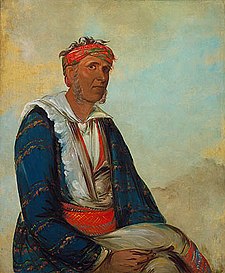John Jolly
| John Jolly | |
|---|---|
| Ahuludegi, Oolooteka | |

Ahuludegi, also known as John Jolly, 1834.
|
|
| Preceded by | Tahlonteeskee |
| Succeeded by | John Looney |
| Personal details | |
| Died | 1838 Webbers Falls, Oklahoma |
| Relations | Brother, Tahlonteeskee; Sister, Jenny Due; Nephews, John Rogers, John Rogers, Jr.; Niece, Tiana Rogers, (wife of Sam Houston) |
John Jolly (Cherokee: Ahuludegi; also known as Oolooteka), was Principal Chief of the Cherokee Nation–West when the 1828 constitution was adopted. He was a friend and protector of a young Sam Houston.
Jolly "was a wealthy merchant and planter. Jolly spoke no English, and dressed in buckskin with a hunting shirt, leggings and moccasins," according to the Cherokee Nation website.
John Jolly was headman of Cayuga town (on Hiwassee Island in present-day Hamilton County, Tennessee), after his brother, Tahlonteeskee's, departure for 'the west' in 1809. He eventually followed his brother to the Arkansaw Territory. There, Jolly was elected Principal Chief of the Cherokee Nation—West upon the death of his brother, in 1819.
Black Coat, who served with Jolly as Second Chief, died in the spring of 1835, and was succeeded by Joseph Vann.
When the young Sam Houston came to live with the Cherokee on Hiwassee Island in 1809, Jolly adopted him and acted as his father in the Cherokee Nation. Jolly gave Houston the Cherokee name of Ka'lanu, meaning 'the Raven'. Houston later returned to his family in Maryville, Tennessee, but he lived once again with the Cherokee in the west during the late 1820s and early 1830s.
In 1828, during Jolly's term of office, the Cherokee Nation—West adopted a constitution establishing a tripartite government, much like that previously adopted by the Cherokee Nation—East (1827). Jolly established a capital city, Tahlonteeskee, named in honor of his brother. That same year, most of the western Cherokee were moved from Indian Reserve areas in the Arkansas Territory to the newly established Indian Territory (in present-day Oklahoma).
...
Wikipedia
